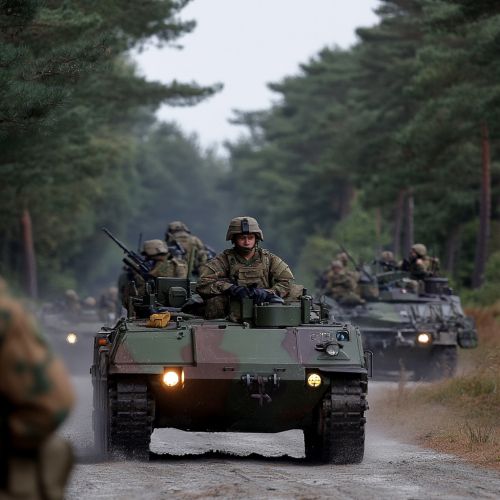Franco-German Brigade
Overview
The Franco-German Brigade is a unique military unit that symbolizes the close cooperation between France and Germany. Established in 1989, it serves as a tangible representation of the reconciliation and partnership between the two nations following the tumultuous events of the 20th century. The brigade is part of the European defense framework and plays a significant role in joint military operations, training, and strategic initiatives within the EU and NATO.
Historical Context
Origins
The creation of the Franco-German Brigade was a direct result of the Élysée Treaty signed in 1963, which laid the groundwork for Franco-German cooperation. The treaty aimed to foster closer political, economic, and cultural ties between the two countries. The idea of a joint military unit emerged in the 1980s as a means to further solidify this partnership, culminating in the brigade's official establishment on October 12, 1989.
Cold War and Reconciliation
The brigade was formed during the final years of the Cold War, a period marked by significant geopolitical tension. Its creation was a bold statement of reconciliation and trust between France and Germany, countries that had been adversaries in two world wars. The brigade's establishment was also a strategic move to enhance European security and defense capabilities independent of the superpowers.
Structure and Organization
Composition
The Franco-German Brigade is composed of units from both the French Army and the German Army. It includes infantry, armored, artillery, and support units, allowing it to conduct a wide range of military operations. The brigade is headquartered in Müllheim, Germany, and operates under a dual command structure, with both French and German officers in leadership positions.
Command and Control
The command structure of the brigade is designed to reflect the equal partnership between the two nations. Leadership positions are shared, with alternating French and German commanders. This dual command system ensures that both countries have an equal say in the brigade's operations and strategic direction.


Training and Operations
The brigade regularly conducts joint training exercises to maintain operational readiness and interoperability. These exercises are crucial for developing a cohesive fighting force capable of responding to various military scenarios. The brigade has been deployed in numerous international missions, including peacekeeping operations in the Balkans and Africa.
Strategic Importance
European Defense Integration
The Franco-German Brigade is a cornerstone of European defense integration. It serves as a model for multinational military cooperation within the EU and NATO. The brigade's existence demonstrates the potential for collaborative defense efforts and contributes to the development of a European defense identity.
NATO and EU Missions
The brigade has participated in several NATO and EU missions, showcasing its versatility and commitment to international security. Its deployments have included peacekeeping operations in the Balkans during the 1990s and more recent missions in Africa, where it has contributed to stability and humanitarian efforts.
Challenges and Criticisms
Operational Challenges
Despite its successes, the Franco-German Brigade faces several operational challenges. Differences in military doctrine, equipment, and language can complicate joint operations. Efforts to harmonize these aspects are ongoing, but they require continuous commitment from both nations.
Political and Strategic Criticisms
The brigade has faced criticism regarding its strategic relevance in the modern security environment. Some argue that its symbolic value outweighs its practical military utility. Additionally, political tensions between France and Germany can occasionally impact the brigade's operations and strategic direction.
Future Prospects
Modernization and Expansion
Looking ahead, the Franco-German Brigade is expected to undergo modernization to enhance its capabilities. This includes updating equipment, improving interoperability, and expanding its role within European defense initiatives. The brigade's future will likely involve greater integration with other EU military units and increased participation in international missions.
Role in European Defense Policy
As the EU seeks to bolster its defense policy, the Franco-German Brigade is poised to play a significant role. Its experience in multinational cooperation makes it a valuable asset for shaping future European defense strategies. The brigade's continued evolution will be crucial for maintaining its relevance in an ever-changing security landscape.
